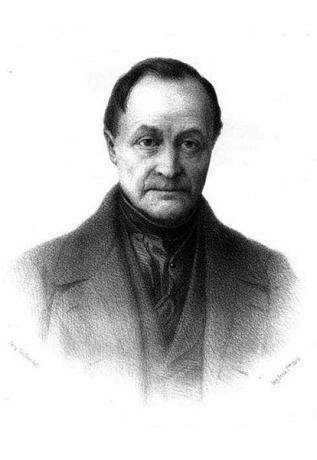Have you heard about Positivism? It is a political, philosophical and scientific current created by one of the most important philosophers and sociologists in the history of humanity: Auguste Comte.
the caller "Three States Law" he was a strong influencer in the formation of the Brazilian Republic, whose doctrine even inspired the motto of our flag – Order and Progress.
Index
- Who was Auguste Comte?
- What is Positivism?
- Contributions to Sociology
- The Law of Three States
- Constitution of an elite of scientists
- Auguste Comte and the Brazilian Republic
- Authors influenced
- Main works by Auguste Comte
Who was Auguste Comte?

Isidore Auguste Marie François Comte was born in Montpellier, France, on January 19, 1798. The son of ardent monarchists and Catholics, he disowned his parental ideals from a very young age, dedicating himself later to studies at the Polytechnic School of Paris.
Comte entered school at age 15 and soon distinguished himself as a brilliant apprentice. During this period, he was secretary to Henri Saint-Simon, an important advocate of utopian socialism. However, years later, the bond between the two was broken by ideological differences.
In 1826, Comte suffered a nervous breakdown while immersed in the creation of a “positive philosophy”. Before that, however, he published “Plan of Scientific Works to Reorganize Society”. As soon as he recovered, in 1830, he joined the staff of the Positive Philosophy Course which took 12 years of his dedication.
At the time, he was employed at the Polytechnic School, but he was dismissed from the institution in 1842 due to disagreements with his superiors. From there, he received the support of important admirers such as John Stuart Mill.
After 17 years of marriage, he separated from Caroline Massin in the same year of her resignation, but in 1845 he met Clotilde de Vaux, with whom he fell in love. She died of tuberculosis a short time later, leaving Comte with the perfect idealization of humanity.
Auguste Comte dedicated the following years of his life to writing the System of Positive Policy until his death in 1857, victim of cancer. Before he died, in 1856, he published the first volume of “Subjective Synthesis”.
What is Positivism?
It is important to note that Comte lived in a period of intense turmoil caused by revolutions and despotism. The scenario caused strong discontent and questioning of traditional values. The social status of the time greatly influenced the studies and production of works by Auguste Comte, who, in turn, believed that everything was the result of a lack of collective consensus.
Positivism was a philosophical current created by Auguste Comte to analyze and understand the state of mind experienced by society in his time. Based on previous sciences, he tried to filter what resulted from reality and allowed the formulation of natural laws.
In other words, knowledge can only be truly obtained through scientific experimentation and benchmarking. One of the fundamental positivist principles is the concept that human knowledge can be systematized according to principles adopted as truth criteria for science.
In other words, the facts analyzed would not start from the consideration of the phenomena, but from the research on their laws. After all, they would all originate from observable phenomena, each with its own particularity.
This idea could be applied to biological, exact sciences as well as social phenomena. This would be at the heart of Sociology, based on the assumption of applying a scientific analysis to society in order to plan its social and political organization.
Such an organization would be extended to religion through the planning of a new spiritual order. Drawing inspiration from the hierarchy of the Catholic Church, Comte preached that humanity should be seen as a single entity called the Great Being.
Even though inspired by Catholicism, Comte denied such a doctrine as being based on the supernatural, not scientific materialism.
Contributions to Sociology
It cannot be said that Auguste Comte was the creator of Sociology because, before him, it already existed, even if in its first steps. However, the sociologist organized it as a social doctrine based on scientific criteria, dividing it into the areas of social dynamics and statics.
- Free Online Inclusive Education Course
- Free Online Toy Library and Learning Course
- Free Online Preschool Math Games Course
- Free Online Pedagogical Cultural Workshops Course
The latter would have the responsibility to study the forces that unite society while the other studies social changes and their causes. Sociology or Social Physics would then be based on observation, experimentation, comparison and classification as methods.
Speaking of which, remember our flag's motto, Order and Progress? Well, this is the main foundation of social statics. From the knowledge of the structure and transformation of society, it would be possible to improve institutions.
The Law of Three States
The Three States Act was devised by Comte to explain human thought. According to the sociologist, the first stage was the theological, in which he resorted to spiritual ideas to explain social phenomena.
The second would be the metaphysician whose main characteristic was to base knowledge on abstractions (final causes and essences, for example). The positive stage would be the last and considered as the intellectual fullness.
In it, man would be able to presuppose the limitations of human understanding, being aware that reason could not operate in any other way than concrete experience. Therefore, laws and science should converge in the search for laws that govern observable phenomena.
Constitution of an elite of scientists
Comte's objective was to structure a plan that would bring well-being to as many people as possible. However, he understood that his social reforms could not be implemented by a democracy but by the institution of an elite of scientists.
For the sociologist, positive science would ground the fraternity led by such an elite, while progress would be promoted by permanent nuclei, such as property and family. However, they would all be interconnected, as if part of a biological organism.
This organism, however, would only be fully functioning if its components were aware of obedience and hierarchy. Discipline should be, from his point of view, taught from school onwards.
To explain this ideal, Comte compared the evolution of the individual to the social, in which childhood would correspond to the theological stage. Spiritual maturity would only come from science whose teaching would be a fundamental role of positivist education.
The core of this current is in teaching altruism and clarifying the order of the world, making students' characters more kind. This practice influenced the institution of the analysis of the efficiency of teaching methods and student performance.
In the twentieth century, the procedures would be improved by behavioral psychology through tests and experiments applied in schools.
Auguste Comte and the Brazilian Republic
Although the project proposed by Comte suggests an evolution of society based on order, his ideals influenced a change of regime in Brazil, more specifically, the proclamation of the Republic.
The explanation may lie in the fact that, at that time, positivism combined with other ideological currents, giving rise to paradoxical results. Among all the entities, the Armed Forces were the ones that most carried the Comtian ideology.
Hence, the explanation for the motto imposed on our flag, as well as measures taken in the first years of the new Republic. As examples, we can cite the education reform in 1891 and the separation of church and state.
Authors influenced
Auguste Comte's legacy influenced other great scholars such as John Stuart Mill, Karl Marx, Harriet Martineau, George Eliot, Émile Durkheim, and Herbert Spencer.
Main works by Auguste Comte
Among the main works written and left by Auguste Comte are:
- Scientific Work Plan to Reorganize Society (1822)
- Booklets on Social Philosophy (1816-1828)
- Positive Philosophy Course (1830-1842)
- Discourse on the Positive Spirit (1844)
- Discourse on the Ensemble of Positivism (1848)
- An Overview of Positivism (1848)
- Positivist Catechism (1852)
- Positive Policy System (1851-1854)
- Appeal to Conservatives (1855)
- Religion of Humanity (1856)
The password has been sent to your email.



